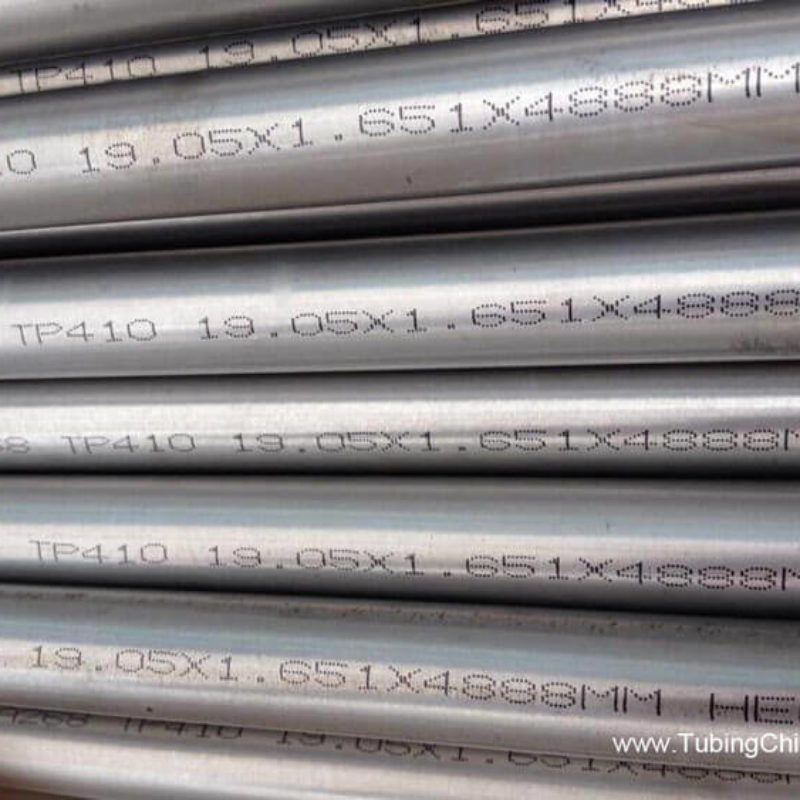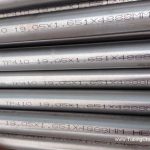ASTM A268 TP410 / ASME SA268 TP410 Tub din oțel inoxidabil
ASTM A268 TP 410 ASME SA268 TP 410 Stainless Steel Seamless Tubing and Welded Pipes
ASTM A268 ASME SA 268 TP410 S41000 is a martensitic stainless steel with high mechanical properties and is ferromagnetic in the annealed or hardened condition. 410 contains the minimum amount of chromium to impart stainless steel properties. 410 resists oxidation and scaling up to 1200 degF. Duritate is one of 410’s best features; It resists abrasion and wear better than most 300 series stainless steel. Grade 410 is often supplied in the hardened, but still machinable condition, for applications where high strength and moderate heat and rezistență la coroziune are required
410 Stainless Steel is the basic, general purpose, hardenable martensitic stainless steel. It is used for highly stressed parts with good rezistență la coroziune and strength. Alloy 410 resists corrosion in mild atmospheres, steam, and many mild chemical environments. The alloy can be heat treated to obtain high strength with good ductilitate.This alloy is used where strength, hardness, and/or wear resistance must be combined with rezistență la coroziune.
410 Stainless Steel is a hardenable, straight-chromium stainless steel which combines the superior wear resistance of high carbon alloys with the excellent rezistență la coroziune of chromium stainless steel. Oil stingere this alloy from temperatures between 1800°F to 1950°F (982-1066°C) produces the highest strength and/or wear resistance as well as corrosion resistance. A range of as-quenched hardnesses is achieved by varying the carbon level from .15% maximum in Alloy 410.
Martensitic stainless steel are optimised for high hardness, and other properties are to some degree compromised. Fabrication must be by methods that allow for poor weldability and usually the need for a final heat treatment. Corrosion resistance of the martensitic is lower than that of the common austenitic grades, and their useful operating temperature range is limited by their loss of ductility at sub-zero temperatures and loss strength by over-tempering at elevated temperatures.
Aplicații
Analiză chimică
Rezistența la coroziune
Proprietăți fizice
Proprietăți mecanice
Fabricating Properties
Tratament termic
410 420 420S45 Oțel inoxidabil tratament termic Quenching
ASTM A240 TP410 Stainless Steel Compoziție chimică (greutate%)
| C | Mn | P | S | Si | Ni | Cr | Fe |
| 0.08-0.15 Max. | 1.00 Max. | 0.040 Max. | 0,030 Max. | 1.00 Max. | 0,75 Max | 11.5 – 13.5 | Echilibru |
EN 10088-3 1.4006 Compoziția chimică a oțelului inoxidabil (greutate%)
| C | Mn | P | S | Si | Ni | Cr | Fe |
| 0.08-0.15 | 1.50 Max. | 0.040 Max. | 0,030 Max. | 1.00 Max. | 0,75 Max | 11.5 – 13.5 | Echilibru |
ASME SA240 SA240M TP410S Stainless Steel Compoziție chimică (greutate%)
| C | Mn | P | S | Si | Ni | Cr | Fe |
| 0,08 Max. | 1.00 Max. | 0.040 Max. | 0,030 Max. | 1.00 Max. | 0,60 Max | 11.5 – 13.5 | Echilibru |
EN 10088-3 1.4000 Compoziția chimică a oțelului inoxidabil (greutate%)
| C | Mn | P | S | Si | Ni | Cr | Fe |
| 0,08 Max | 1.00 Max. | 0.040 Max. | 0,030 Max. | 1.00 Max. | 12.0 – 14.0 | Echilibru |
ASTM A268 ASME SA268/SA268M TP 410 Stainless Steel Mechanical Properties
| Rezistența la tracțiune | Rezistența la cedare | Alungire | Duritate |
| 60 ksi (415 Mpa) Min. | 30ksi (205 Mpa)Min. | 20% Min. | HRB 95 Max. |
410 Stainless Steel Physical Properties
Typical physical properties for annealed grade 410 stainless steels are given in table 6.
Physical properties of 410 grade stainless steel in the annealed condition
| Grad | Densitate (kg/dm³) | Modul de elasticitate (GPa) | Coeficientul mediu de dilatare termică (mm/m/°C) 0-100°C | Coeficientul mediu de dilatare termică (mm/m/°C) 0-315°C | Coeficientul mediu de dilatare termică (mm/m/°C) 0-538°C> | Conductivitate termică (W/m.K) la 100°C | Conductivitate termică (W/m.K) la 500°C | Căldură specifică 0-100°C (J/kg.K) | Rezistivitatea electrică (nW.m) |
| 410 | 7.75 | 200 | 9.9 | 11.4 | 11.6 | 24.9 | 28.7 | 460 | 570 |
410 Stainless Steel Corrosion Resistance
410 resists dry atmosphere, fresh water, mild alkalies and acids, food, steam and hot gases. Must be hardened for maximum heat and corrosion resistance. Performance is best with a smooth surface finish. Less corrosion resistant than the austenitic grades and also less than 17% chromium ferritic alloys such as Grade 430.
410 Stainless Steel Heat Resistance
Good resistance to scaling up to approximately 650°C, but generally not recommended for use in temperatures between 400 and 580°C, because of the reduction in mechanical properties.
410 Stainless Steel Tratament termic
410 Stainless Steel Recoacere
Full anneal – 815-900°C, slow furnace cool to 600°C and then air cool.
Process Anneal – 650-760°C and air cool.
410 Stainless Steel Hardening
Se încălzește la 925-1010°C, urmată de călire în ulei sau în aer. Ulei stingere este necesară pentru secțiunile grele. Se temperează, în general în intervalul 200-400°C, pentru a obține o mare varietate de valori de duritate și proprietăți mecanice după cum se indică în tabelul alăturat.
Intervalul de călire 400-580°C trebuie, în general, evitat.
410 Stainless Steel Welding
Readily welded by all standard methods, but a pre-heat of 150-260°C and post-weld annealing treatment is required to reduce the possibility of cracking. Use Grade 410 welding rod if post hardening and temperare is involved. If parts are to be used in the “as welded” condition, a ductile joint can be achieved by using Grade 309 filler rod.
AS 1554.6 pre-qualifies welding of 410 with Grade 309 rods or electrodes.
410 Stainless Steel Machining
In the annealed or highly tempered conditions grade 410 is relatively easily machined, but if hardened to above 30HRC machining becomes more difficult. Free machining grade 416 is a very readily machined alternative.
410 Stainless Steel Standards
| Bar | Fitinguri sudate cap la cap | Forjare | Țevi, sudate și fără sudură | Farfurie |
| A276, A479 | A815 | A182 | ASTM A268 / ASME SA 268 | A240 |



| Tip | Fără sudură & Țevi sudate | Fitinguri sudate cap la cap | Flanșe și fitinguri de presiune |
| Mărimi | 1/4″ până la 16″ | 1/2″ până la 12″ | Toate descrierile |
| Programe | Sch 10, 40, 80, 160, & XXH | Sch 10, 40, 80, 160, & XXH |
Grade Specificati on Comparison Chart
Approximate grade comparisons for 410 stainless steel are given in table.
Grade specifications for 410 grade stainless steel
| Grad | UNS | BS | BS | RO | RO | suedeză | Japoneză |
| – | Nu. | RO | Nume și prenume | SS | JIS | ||
| 410 | S41000 | 410S21 | 56A | 1.4006 | X12Cr13 | 2302 | SUS 410 |
These comparisons are approximate only.
410 Stainless Steel Possible Alternative Grades
Possible alternative grades to grade 410 stainless steels are given in table 8.
Table 8. Possible alternative grades to 410 grade stainless steel
| Grad | Why it might be chosen instead of 410 |
| 416 | High machinability is required, and the lower corrosion resistance of 416 is acceptable. |
| 420 | A higher hardened strength or hardness than can be obtained from 410 is needed. |
| 440C | A higher hardened strength or hardness than can be obtained even from 420 is needed. |
410 Stainless Steel Export Destinations
| ORIENTUL MIJLOCIU Arabia Saudită Iran Irak EAU Qatar Bahrain Oman Kuwait Turcia Yemen Siria Iordania Cipru | AFRICA Nigeria Algeria Angola Africa de Sud Libia Egipt Sudan Guineea Ecuatorială Republica Congo Gabon AMERICA DE NORD SUA Canada Mexic Panama Costa Rica Puerto Rica Trinidad și Tobago Jamaica Bahamas Danemarca | EUROPA Rusia Norvegia Germania Franța Italia MAREA BRITANIE Spania Ucraina Țările de Jos Belgia Grecia Republica Cehă Portugalia Ungaria Albania Austria Elveția Slovacia Finlanda Irlanda Croația Slovenia Malta | ASIA India Singapore Malaezia Indonezia Thailanda Vietnam Coreea de Sud Japonia Sri Lanka Maldive Bangladesh Mayanmar Taiwan Cambodgia AMERICA DE SUD Argentina Bolivia Brazilia Chile Venezuela Columbia Ecuador Guyana Paraguay Uruguay |
Referințe conexe:
1. Oțel inoxidabil superferritic
2. Ferritic Ferrit Oțel inoxidabil
3. Tabelul de comparare a gradelor de oțel inoxidabil ferritic
4. Comparativ cu oțelul inoxidabil ferritic, oțelul inoxidabil duplex vulnerabil


